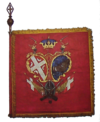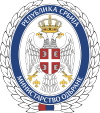Toma Vučić Perišić
Prince Toma Vučić Perišić | |
|---|---|
 Portrait by Jovan Popović, 1841 | |
| Minister of Internal Affairs | |
| In office 1840–1842 | |
| Preceded by | Cvetko Rajović |
| Succeeded by | Ilija Garašanin |
| Personal details | |
| Born | 1787 Barič, Ottoman Empire (modern-day Serbia) |
| Died | 1859 Belgrade, Principality of Serbia |
| Awards | Order of Glory |
Prince[1] Toma Vučić Perišić (Serbian Cyrillic: Тома Вучић Перишић; 1787 – 13 July 1859) was a Serbian politician, military leader during the Serbian Revolution, Freemason and one of the most powerful and influential individuals in Serbia of the 19th century.[2] He was Miloš Obrenović's most virulent opponent, and an ally of the Karađorđević Dynasty[3][4][5][6] with Avram Petronijević and Ilija Garašanin and other so-called Constitutionalists (Dimitrije Davidović, Aleksa Simić, Stojan Simić, Milutin Savić).[7] He wanted to bring rule of law and an effective administrative system in the Principality of Serbia, if only foreign interference was not an issue.[8] Eventually, in the political tug-of-war, the constitutionalists period came to an abrupt end with the former absolute ruler reclaiming the throne.[9]
He married twice, first time with Perunika Žabarac and second wife Agnija nicknamed Nula, sister of a Greek revolutionary leader of the Greek War of Independence, Yiannis Pharmakis.[10] With his first wife he had four children, two daughters (Stanka and Anka) and two sons (Stevan and Ilija).[10] According to some sources, Vučić dug out his own eye with a fork during a lunch, because he had an eye pain.[11]
A street in Belgrade is named after him.[12]
See also
References
- ^ "A Few Notes About Grants of Titles of Nobility by Modern Serbian Monarchs". Nobiltà - Rivista di Araldica, Genealogia, Ordini Cavallereschi, Pubblicazione Scientifica Bimestrale di Storia e Scienze Ausiliarie. January 2019. Retrieved 2022-06-28.
- ^ "Gospodar Vučić 1842. sa Metinog Brda bombardovao Kragujevac". Prvi Prvi na Skali. Retrieved 2019-09-11.
- ^ Norris, D. (1999-08-25). In the Wake of the Balkan Myth: Questions of Identity and Modernity. Springer. ISBN 9780230286535.
- ^ Norris, David (2016-05-05). Haunted Serbia: Representations of History and War in the Literary Imagination. Routledge. ISBN 9781317196389.
- ^ Norris, David A. (2009). Belgrade: A Cultural History. Oxford University Press. ISBN 9780195376081.
- ^ Singleton, Fred; Fred, Singleton (1985-03-21). A Short History of the Yugoslav Peoples. Cambridge University Press. p. 91. ISBN 9780521274852.
- ^ "Srpsko Nasledje". www.srpsko-nasledje.rs. Retrieved 2019-08-25.
- ^ Singleton, Fred; Fred, Singleton (1985-03-21). A Short History of the Yugoslav Peoples. Cambridge University Press. p. 91. ISBN 9780521274852.
- ^ Jelavich, Charles; Jelavich, Barbara (2012-09-20). The Establishment of the Balkan National States, 1804-1920. University of Washington Press. ISBN 9780295803609.
- ^ a b Babić, M (7 February 2014). "BG ULICE: Ko je bio gospodar Toma Vučić?". Telegraf. Retrieved 4 April 2020.
- ^ Поповић, Радомир Ј (2003). Тома Вучић Перишић. Службени Гласник. p. 209. ISBN 9788677430399.
- ^ "How did the "Gospodara Vucica" street get its name? | It happened once in Belgrade". 011info - the best guide through Belgrade. Retrieved 2019-09-17.




